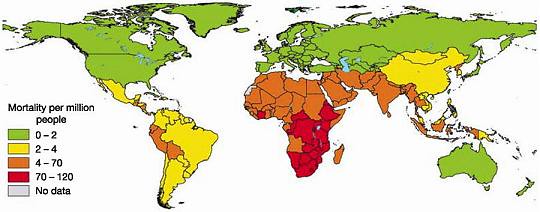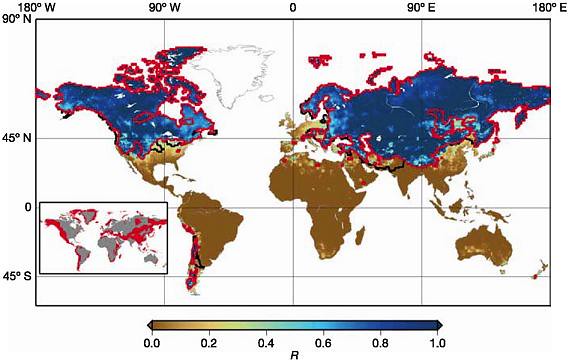Who will suffer most from global warming? The Independent last week had a story (mirror) summarising a pair of articles in the latest issue of Nature. The first, a WHO paper on the "impact of regional climate change on human health", looks at the effects of climate change on mortality. It calculates the expected increase in death rates from both infectious and non-infectious sources. The results are summarised in the map below:

What's stark from this is the sheer inequality in how the effects of climate change (as measured in human deaths) will be distributed. The rich world, who emit most of the greenhouse gases, and who are best able to deal with the consequences, will get off lightly. Instead, the burden will fall almost entirely on the poor. We will pollute, and they will die - from floods, heatstroke, malaria, diarrhoea, malnutrition and crop failure. The injustice is simply staggering.
The second article, on "potential impacts of a warming climate on water availability in snow-dominated regions" looked at climate change's effects on the global water supply. Their results are summarised in this map:

This shows
Accumulated annual snowfall divided by annual runoff over the global land regions... The red lines indicate the regions where streamflow is snowmelt-dominated, and where there is not adequate reservoir storage capacity to buffer shifts in the seasonal hydrograph. The black lines indicate additional areas where water availability is predominantly influenced by snowmelt generated upstream (but runoff generated within these areas is not snowmelt-dominated).
(Ignore the inset, it's not relevant).
In English, this is telling us where it snows, and where people get their water from snow. Existing climate models predict an increase in the water cycle generally - hotter temperatures equals more evaporation, equals more precipitation - so these areas will get more snow in winter to melt and provide them with water. However, increased temperatures also mean that that snow will melt earlier in the year, producing a longer dry season and likely shortages. In other words, global warming will give us a drier world. Unlike the first map, though, most of the consequences will be felt in the rich, industrialised, polluting north. I guess there's some justice after all...






2 comments:
There are further implications of this which have been troubling me since I first read that report.

Principally - if the changes will be mostly felt in the global south, then the relatively insulated global north will be able to maintain the status quo for longer than if the impact was evenly spread.
(Consider the fundie-Protestant mythology of "you are the primary cause of your own fate" that underlies politics in the US, and the non-rational framing of this disparity that will likely result, for just one example of how this can/will operate. Not that the US will be alone in this washing-of-hands.)
Posted by Anonymous : 11/28/2005 11:50:00 PM
I consider the first map dubious because I would expect at least some countries to have a reasonable drop in expected deaths For example russia - if your winters became, lets say, -10 deg instead of -18deg and this is the time where most of the weak die expected deaths might easily be slashed.
Posted by Genius : 11/29/2005 06:52:00 AM
Post a Comment
(Anonymous comments are enabled).